An interview with Jules Jay from the Hurstbridge Edible Hub
In March 2024, Ann Stanley visited the Edible Hub in Hurstbridge.
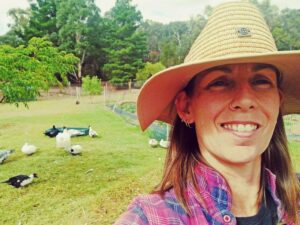 I recently took my surplus eggs and tomatoes to the food swap at the Hurstbridge Edible Hub and came home with cucumbers, passata and some garlic cloves to re-plant. I got the garlic cloves from pop-up garlic farmer, Vicky-Rae Elmore, along with some advice about when best to plant them.
I recently took my surplus eggs and tomatoes to the food swap at the Hurstbridge Edible Hub and came home with cucumbers, passata and some garlic cloves to re-plant. I got the garlic cloves from pop-up garlic farmer, Vicky-Rae Elmore, along with some advice about when best to plant them.
While I was there, I had a chat with community organiser Jules Jay, whose energy, enthusiasm and expertise help to keep the Edible Hub a positive and vibrant place.
As well as the twice a month food swap, there is the community garden which is a true community food-growing garden where anyone can pick anything at any time. There’s also a drop off point for free food, where community members can collect some goods that 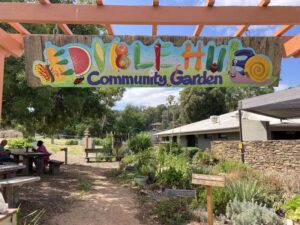 supermarkets would otherwise discard.
supermarkets would otherwise discard.
Following the renovation of the Hurstbridge Community Hub at Graysharps Road in 2016, Tracy Bjorksten, Sabi Buehler and Pam Jenkins decided to rejuvenate and cultivate six wicking beds that had been established at the site then more or less abandoned. Jules joined them soon after and it grew from there.
(Sometimes, when councils are reluctant to approve a community garden, it is because they know that the initial enthusiasm is not always enough to fuel the project to the extent required for its ongoing viability.)
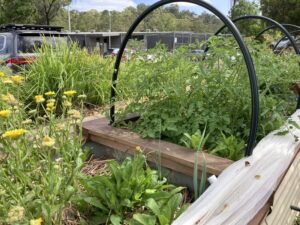 Tracy has now moved away from the area but Sabi, Pam and Jules, plus new participants Val, Leanne and Gala, meet every Thursday morning at 9.30, garden until 11, then sit for an hour or so chatting over tea and cake.
Tracy has now moved away from the area but Sabi, Pam and Jules, plus new participants Val, Leanne and Gala, meet every Thursday morning at 9.30, garden until 11, then sit for an hour or so chatting over tea and cake.
As a team, they also collaborate with other groups such as the local Social Connections Group in which older people from rural areas fold seed packets for the seed library..
The success of the Edible Hub is about having multiple attractions, such as the tables that people use for lunch and the fairy tree that children come with their parents or grandparents to look at. There are the usual vegetable beds plus a small sensory garden with paths to wander along and plants to touch, see and smell. They have fruit trees, a book exchange, and 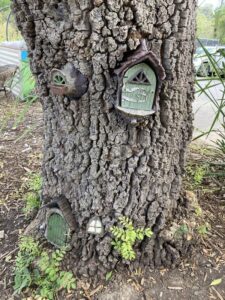 community ‘share shelves’, where everyday items are shared and swapped, and a seed library.
community ‘share shelves’, where everyday items are shared and swapped, and a seed library.
Jules, What motivates you to be such a committed connector of people?
“I am an environmentalist at heart but I also have a Masters in Positive Psychology. Positive psychology attracted me because, when it comes to social and behaviour change, particularly in relation to the environmental challenges we face, I don’t find the ‘fear and threat’ approach useful. I prefer to ask, ‘what strengths do we have right here and where can we find hope?’ And I love working with the community.”
Do you think the grassroots level is the best place to seed social and behaviour change?
“Yes. Because of the ‘glacial’ pace of the higher levels of government, the most fertile opportunities for change are at the grassroots level. But local councils have a huge role to play facilitating community initiatives with grants. It’s not the job of local government to come up with ideas but to facilitate the good ideas of local people. I have only praise for the ways that the Nillumbik Shire does this. Talking to the right person is key.”
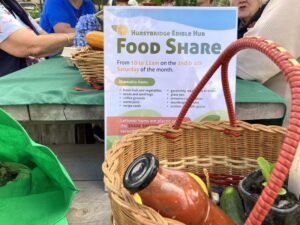 As well as convening the community garden, Jules co-runs the Nillumbik Repair Cafe, which helps people connect with each over reducing the mindless waste of objects that can be repaired or re-purposed by those with the skills and generosity to do so.
As well as convening the community garden, Jules co-runs the Nillumbik Repair Cafe, which helps people connect with each over reducing the mindless waste of objects that can be repaired or re-purposed by those with the skills and generosity to do so.
